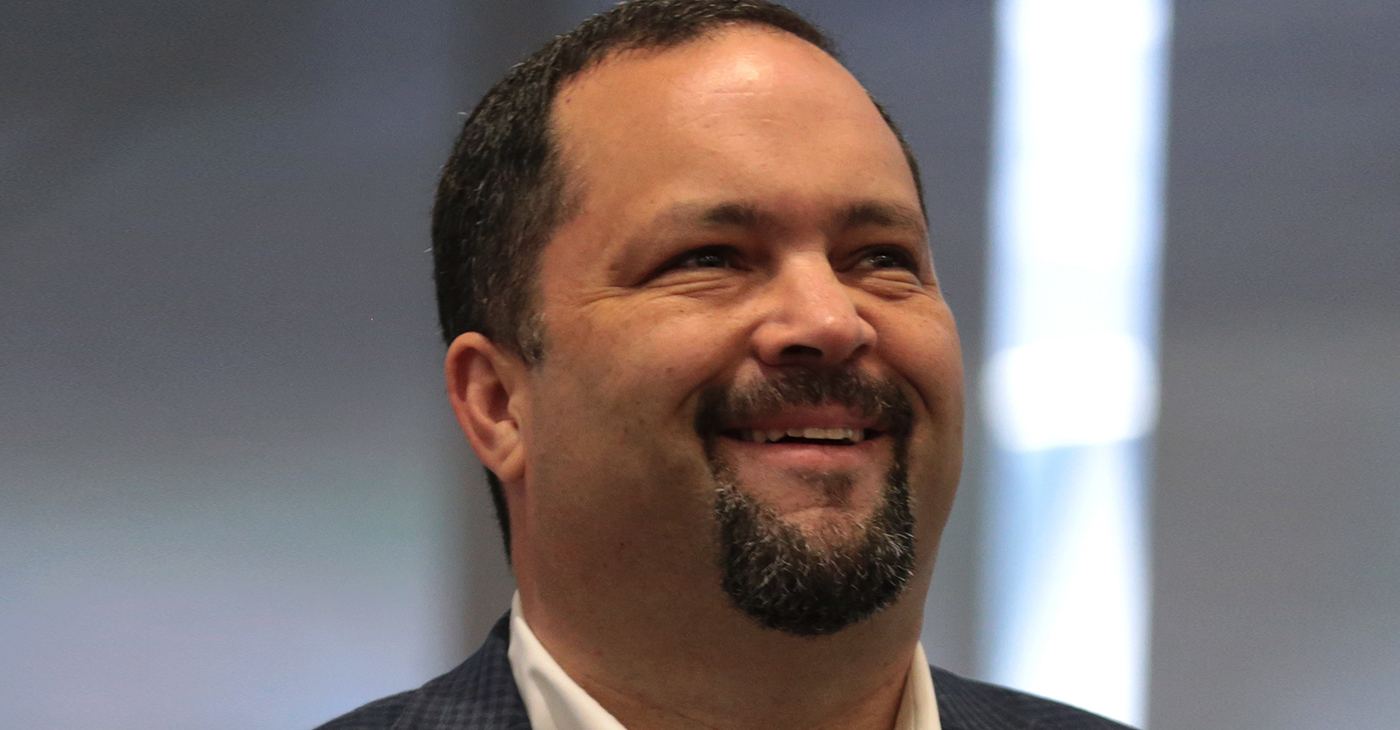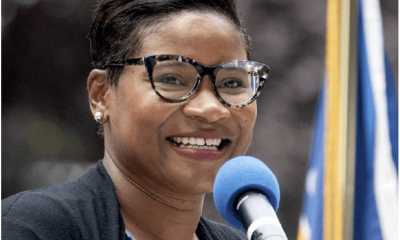Activism
COMMENTARY: From Selma to the Supreme Court, We Are Still Making History
A coalition of local and national civil rights groups used this year’s Bloody Sunday commemorations as a time to look forward as well as back. They organized a march and a series of voting rights events along the route of the original Selma to Montgomery march. They are lifting up younger generations of leaders and mobilizing activists around the nation, between voting rights and the broader movement to advance opportunity and economic justice.

By Ben Jealous
History was made in Selma, Alabama, on March 7, 1965. Alabama state troopers viciously attacked peaceful voting rights marchers at the Edmund Pettus Bridge. The troopers were hoping to stop the voting rights movement in its tracks.
But their violence did the opposite. Televised images of “Bloody Sunday” offended the conscience of people of good faith around the country. The movement was energized. And soon, the federal Voting Rights Act became law.
Voting rights activists were back in Selma this month to commemorate history — and to make it.
Vice President Kamala Harris spoke at the Edmund Pettus bridge. As the first Black woman to hold that high office, she embodies many of the victories of the civil rights movement. From that “hallowed ground,” she spoke truth about the “un-American” laws that have passed in many states to make it harder for Black people and others to vote.
Harris recognized that 2022 is not 1965, as her presence made clear. “We again, however, find ourselves caught in between,” she said.
“Between injustice and justice. Between disappointment and determination. Still in a fight to form a more perfect union. And nowhere is that clearer than when it comes to the ongoing fight to secure the freedom to vote.”
The threat to voting rights today comes most directly from state legislators and governors putting laws in place that make it harder for Black people and others to vote. The threat also comes from a far-right-dominated Supreme Court that has mostly abandoned voting rights in favor of “states’ rights.”
In a 2013 decision in a case that began in Shelby County, Alabama, the court’s majority gutted a section of the Voting Rights Act that prevented states from imposing racially discriminatory changes in voting laws and regulations.
Since then — and especially since historic turnout by Black voters helped defeat Donald Trump’s reelection bid—legislators in state after state have passed new barriers to voting. The Supreme Court is letting them get away with it.
And just recently the Supreme Court’s far-right justices allowed Alabama to hold elections this year using racially gerrymandered congressional maps created by the state Legislature. That was another signal to Black voters and voting rights supporters that the current court majority cannot be counted on to protect our rights.
We must organize. We must elect pro-voting-rights majorities in Congress and state legislatures wherever we can. And we must demand that they take action to protect our democracy.
That brings us back to Selma. As a young man, the late Rep. John Lewis nearly gave his life on the Edmund Pettus bridge to secure voting rights. Activist leaders of this generation are now building on that history and making their own.
A coalition of local and national civil rights groups used this year’s Bloody Sunday commemorations as a time to look forward as well as back. They organized a march and a series of voting rights events along the route of the original Selma to Montgomery march. They are lifting up younger generations of leaders and mobilizing activists around the nation, between voting rights and the broader movement to advance opportunity and economic justice.
At the same time, civil rights activists around the country are organizing to achieve another historical milestone: the confirmation of Judge Ketanji Brown Jackson as the first Black woman to serve as a U.S. Supreme Court justice. As expected, Judge Jackson’s nomination has been met with some resistance and racist commentary. But it is generating even more excitement and enthusiasm.
Our country’s history is in part a history of struggle to achieve hard-won progress toward more universal access to rights and opportunities. That is still our struggle today. Like the work of the activist leaders who are building a movement to protect voting rights and expand access to opportunity, the confirmation of Judge Jackson will move the nation forward toward the ideal of equal justice. It’s our turn to keep our feet on the ground, our shoulders to the wheel, and our eyes on the prize.
Ben Jealous serves as president of People For the American Way and Professor of the Practice in the Africana Studies Department at the University of Pennsylvania where he teaches leadership. Jealous has decades of experience as a leader, coalition builder, campaigner for social justice and seasoned nonprofit executive.
Activism
OP-ED: AB 1349 Puts Corporate Power Over Community
Since Ticketmaster and Live Nation merged in 2010, ticket prices have jumped more than 150 percent. Activities that once fit a family’s budget now take significant disposable income that most working families simply don’t have. The problem is compounded by a system that has tilted access toward the wealthy and white-collar workers. If you have a fancy credit card, you get “presale access,” and if you work in an office instead of a warehouse, you might be able to wait in an online queue to buy a ticket. Access now means privilege.

By Bishop Joseph Simmons, Senior Pastor, Greater St. Paul Baptist Church, Oakland
As a pastor, I believe in the power that a sense of community can have on improving people’s lives. Live events are one of the few places where people from different backgrounds and ages can share the same space and experience – where construction workers sit next to lawyers at a concert, and teenagers enjoy a basketball game with their grandparents. Yet, over the past decade, I’ve witnessed these experiences – the concerts, games, and cultural events where we gather – become increasingly unaffordable, and it is a shame.
These moments of connection matter as they form part of the fabric that holds communities together. But that fabric is fraying because of Ticketmaster/Live Nation’s unchecked control over access to live events. Unfortunately, AB 1349 would only further entrench their corporate power over our spaces.
Since Ticketmaster and Live Nation merged in 2010, ticket prices have jumped more than 150 percent. Activities that once fit a family’s budget now take significant disposable income that most working families simply don’t have. The problem is compounded by a system that has tilted access toward the wealthy and white-collar workers. If you have a fancy credit card, you get “presale access,” and if you work in an office instead of a warehouse, you might be able to wait in an online queue to buy a ticket. Access now means privilege.
Power over live events is concentrated in a single corporate entity, and this regime operates without transparency or accountability – much like a dictator. Ticketmaster controls 80 percent of first-sale tickets and nearly a third of resale tickets, but they still want more. More power, more control for Ticketmaster means higher prices and less access for consumers. It’s the agenda they are pushing nationally, with the help of former Trump political operatives, who are quietly trying to undo the antitrust lawsuit launched against Ticketmaster/Live Nation under President Biden’s DOJ.
That’s why I’m deeply concerned about AB 1349 in its current form. Rather than reining in Ticketmaster’s power, the bill risks strengthening it, aligning with Trump. AB 1349 gives Ticketmaster the ability to control a consumer’s ticket forever by granting Ticketmaster’s regime new powers in state law to prevent consumers from reselling or giving away their tickets. It also creates new pathways for Ticketmaster to discriminate and retaliate against consumers who choose to shop around for the best service and fees on resale platforms that aren’t yet controlled by Ticketmaster. These provisions are anti-consumer and anti-democratic.
California has an opportunity to stand with consumers, to demand transparency, and to restore genuine competition in this industry. But that requires legislation developed with input from the community and faith leaders, not proposals backed by the very company causing the harm.
Will our laws reflect fairness, inclusion, and accountability? Or will we let corporate interests tighten their grip on spaces that should belong to everyone? I, for one, support the former and encourage the California Legislature to reject AB 1349 outright or amend it to remove any provisions that expand Ticketmaster’s control. I also urge community members to contact their representatives and advocate for accessible, inclusive live events for all Californians. Let’s work together to ensure these gathering spaces remain open and welcoming to everyone, regardless of income or background.
Activism
Oakland Post: Week of December 31, 2025 – January 6, 2026
The printed Weekly Edition of the Oakland Post: Week of – December 31, 2025 – January 6, 2026

To enlarge your view of this issue, use the slider, magnifying glass icon or full page icon in the lower right corner of the browser window.
Activism
Big God Ministry Gives Away Toys in Marin City
Pastor Hall also gave a message of encouragement to the crowd, thanking Jesus for the “best year of their lives.” He asked each of the children what they wanted to be when they grow up.

By Godfrey Lee
Big God Ministries, pastored by David Hall, gave toys to the children in Marin City on Monday, Dec. 15, on the lawn near the corner of Drake Avenue and Donahue Street.
Pastor Hall also gave a message of encouragement to the crowd, thanking Jesus for the “best year of their lives.” He asked each of the children what they wanted to be when they grew up.
Around 75 parents and children were there to receive the presents, which consisted mainly of Gideon Bibles, Cat in the Hat pillows, Barbie dolls, Tonka trucks, and Lego building sets.
A half dozen volunteers from the Big God Ministry, including Donnie Roary, helped to set up the tables for the toy giveaway. The worship music was sung by Ruby Friedman, Keri Carpenter, and Jake Monaghan, who also played the accordion.
Big God Ministries meets on Sundays at 10 a.m. at the Mill Valley Community Center, 180 Camino Alto, Mill Valley, CA Their phone number is (415) 797-2567.
-

 Activism4 weeks ago
Activism4 weeks agoDesmond Gumbs — Visionary Founder, Mentor, and Builder of Opportunity
-

 Activism4 weeks ago
Activism4 weeks agoFamilies Across the U.S. Are Facing an ‘Affordability Crisis,’ Says United Way Bay Area
-

 Alameda County4 weeks ago
Alameda County4 weeks agoOakland Council Expands Citywide Security Cameras Despite Major Opposition
-

 Alameda County4 weeks ago
Alameda County4 weeks agoBling It On: Holiday Lights Brighten Dark Nights All Around the Bay
-

 Activism4 weeks ago
Activism4 weeks agoBlack Arts Movement Business District Named New Cultural District in California
-

 Activism4 weeks ago
Activism4 weeks agoLu Lu’s House is Not Just Toying Around with the Community
-

 Activism4 weeks ago
Activism4 weeks agoOakland Post: Week of December 17 – 23, 2025
-

 Black History3 weeks ago
Black History3 weeks agoAlfred Cralle: Inventor of the Ice Cream Scoop




















































